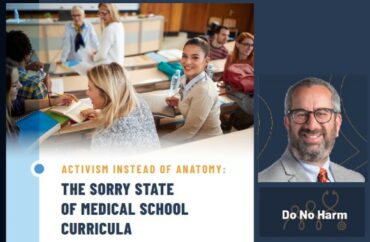
‘Medical schools are shifting resources away from the science and practice of caring for patients and toward satisfying political goals,’ scholar says
American medical schools are focusing too much on political agendas and not enough on health care education, a medical watchdog organization warned in a recent report.
The report “Activism Instead of Anatomy” from Do No Harm states that diversity, equity, and inclusion politics are crowding out scientific medical education at many schools across the country.
“If medical schools are short-changing rigorous training in science for the political indoctrination of future doctors, there are real consequences. Lives are on the line,” author and senior fellow Jay Greene wrote.
Greene, (pictured) a former education professor at the University of Arkansas, told The College Fix that this “politicization” is “reducing the quality of training which results in worse care for patients.”
“The people who run and teach in med schools decided to offer these politicized courses either to serve their own preferences or to satisfy the accreditors dominated by the [American Medical Association] and [Association of American Medical Colleges]. The broader politicization of medicine may also be influencing these actors,” Greene said in a recent email.
The College Fix contacted the Association of American Medical Colleges and the American Medical Association, inquiring about the report and their commitment to unbiased physician education.
An AAMC spokesperson declined to comment, and the AMA did not respond to several emailed requests for comment over the past several weeks.
For the report, Greene examined the course catalogs of 20 leading medical schools to determine how often specific, politicized words were used as compared to traditional, medical terminology.
This research technique known as “content analysis” was used to determine how many times eight politicized words such as “race/racism,” “identity,” and “diversity” were used compared to eight scientific or medical terms such as “Hippocratic/Hippocrates,” “anatomy,” “obesity,” and “placebo.”
Combining results for all 20 course catalogs, the eight politicized terms appeared 2,406 times, while the eight traditional, medical terms appeared only 1,928 times.
The most commonly used term was “social,” and it appeared about 44 times on average in each medical school’s catalog. The research also found the term “diversity” is mentioned more often than “chemistry.”
MORE: Yale mental health clinic asks kids about racism
One of the medical terms searched, “obesity,” appears less often than all eight of the politicized terms in all 20 course lists and descriptions, the report found.
“Medical school courses focus more on ‘justice’ than they do on ‘obesity,’ even though it’s “one of the country’s most serious health challenges,” the report found.
More than two in five American adults suffer from obesity, according to a Centers for Disease Control report.
At Stanford University School of Medicine in California, ideological terms appeared twice as many times as medical terminology, according to the report.
Another example of politicization identified in the report was the course “Human Rights and Medicine” at the Baylor College of Medicine in Texas.
According to the course description, students learn about “immigration reform and its effect on medical care, … gender issues in medicine and cross-cultural considerations, HIV and associated discrimination, access to care and the rights of the uninsured in America, and issues of distributive justice affected by militarization in society.”
Greene said the problem is wide-spread but fixable.
“There are a number of steps that could be taken to restore medical training to its proper mission,” he told The Fix.
“The chief among these would be that many of these med schools are public institutions accountable to policymakers in their states who appropriate funds to subsidize their operations,” he said. “Those state policymakers could signal informally or in legislation, their desire that med schools focus on scientific training rather than political indoctrination.”
Greene said something needs to be done on the federal level as well.
“Federal policymakers could play a similar role with private medical schools, which are also heavily subsidized with federal tax dollars,” he said.
He said Americans deserve expertise over politicization, because it directly impacts their safety.
“Similarly, if the training of civil engineers spent more time on politics and less on bridge and street design, we’d have more bridges that collapsed and less safe roads,” Greene told The Fix.
MORE: Duke doctor who was fired after questioning racism claims speaks out
IMAGE: Do No Harm
Like The College Fix on Facebook / Follow us on Twitter






Please join the conversation about our stories on Facebook, Twitter, Instagram, Reddit, MeWe, Rumble, Gab, Minds and Gettr.